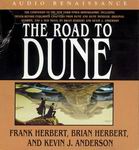
 The Road to Dune
The Road to Dune
By Frank Herbert, Brian Herbert, and Kevin J. Anderson; Read by Scott Brick
12 CD’s – 14 hours [UNABRIDGED]
Publisher: Audio Renaissance
Published: JUST RELEASED – September 2005
ISBN: 159397776X
Themes: / Science Fiction / Dune / Desert / Religion / Commentary / Journal / Short Fiction /
In a sentence, The Road to Dune is an intriguing collection of Dune “extras” that should please any fan of Frank Herbert. Including myself.
A quick background on me as far as Dune goes – I read the first novel once, then listened to George Guidall’s unabridged narration of the same book. I also heard The Butlerian Jihad, which was written by Brian Herbert (Frank Herbert’s son) and Kevin J. Anderson. I mention all this so that you can know my level of Dune knowledge – I am by no means an expert. With that said, I thoroughly enjoyed this book.
Brian Herbert and Kevin J. Anderson, as you may know, have continued Frank Herbert’s Dune series by adding two trilogies of prequels to Herbert’s existing books. They’ve consulted notes that Frank Herbert left behind, and the opening of this book explains that to some degree. Bill Ransom, who collaborated with Frank Herbert on a few books, also weighs in, describing his writing life with Frank.
Next up is a short novel called Spice Planet which represents the first version of Dune, or what Dune could have been. The novel is certainly better, but Dune World was also engaging and interesting from the perspective of a person who has read the novel (what’s different, what’s the same) and as a very good story in its own right.
Also included are deleted scenes and alternate endings from Dune and Dune, Messiah, letters and notes from Frank Herbert during the time he was trying to get Dune published. Especially interesting are some letters to and from John W. Campbell, Jr., the editor of Analog Science Fiction Magazine, which serialized the first Dune novel, but declined the second one.
Four short stories by Brian Herbert and Kevin J. Anderson are here, too. The first, “Whisper of Caladan Seas” was originally published in Amazing Science Fiction and takes place during the first Dune novel. The other three, “Hunting Harkonnens”, “Whipping Mek”, and “Faces of a Martyr” are set in the prequel times that Brian Herbert and Kevin J. Anderson write about in their trilogies. They are very good stories, all.
Scott Brick narrated, and I am reminded why I enjoy him so much. His narration is energetic, dramatic, and powerful, but never over the top. I never tire of his rich voice and the believable, living characters he performs.
I wholeheartedly recommend this book on several levels. For a person writing a thick tome of a science fiction novel, this glimpse into Herbert’s process is very educational. For a fan of Dune, this look into what could have been is very entertaining. For a fan interested in the history science fiction, the correspondence between Campbell and Herbert and the story of the novel’s purchase and publication by Chilton are pure gold. And for a fan of good stories, there’s plenty here to enjoy.
Posted by Scott D. Danielson







